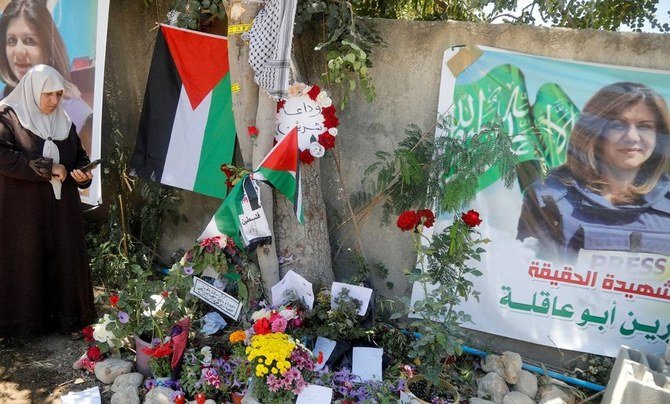
- ARAB NEWS
- 04 Jul 2025

Do the issues of who you are and where you are murdered impact the coverage given to your case by the mainstream American news media and US politicians? It seemingly does have relevance when you compare the tragic recent killings of two women, one a Palestinian and another an Iranian.
Mahsa Amini, the Iranian woman, was last month arrested for not wearing a hijab by Iran’s frightening so-called morality police. She died in prison, with Iran claiming she had a heart condition and her family asserting that she was tortured.
Shireen Abu Akleh, 51, an American citizen of Palestinian heritage, was shot in the head and killed by an Israel Defense Forces sniper in May, while she was reporting for an Arab news network on a combined IDF and Shin Bet raid of a neighborhood in Jenin. She was wearing easy-to-see clothing identifying her as a journalist.
Amini was 22 and came from a small Iranian town that had never previously been associated with protests. She was visiting Tehran and was with her brother at the city’s train station when she was taken into custody for not wearing a hijab.
Iran’s morality police are similar to Israel’s secret service, which often grabs Palestinian civilians from their beds in the middle of the night like sinister figures in a horror story. They are both spooky and frightening and have histories of bringing death to innocent people.
As highlighted by these two cases, both Israel and Iran have brutal military forces that often murder civilians. In Israel, the IDF and Shin Bet target non-Jews who protest against the government’s apartheid and then describe the victims as “terrorists.” In Iran, the Islamic Revolutionary Guard Corps targets anyone engaged in protests or the disruption of society, arresting, jailing and often torturing them. Some never leave the prison system, as was the fate of Amini.
But how did the US react to these two incidents, which took place only months apart?
When Abu Akleh was killed, large sections of the media immediately came to Israel’s defense, challenging Palestinian claims that she was intentionally killed by an Israeli sniper. Israel asserted, as it always does, that Abu Akleh was killed by Palestinian “terrorist” gunfire.
Several members of Congress demanded an investigation, but it was how they demanded it that varied. Some wanted to know the specific details, giving Israel the benefit of the doubt, while others accused Israel of being responsible. Most mainstream US media outlets covered Abu Akleh’s killing, but couched it in terms of uncertainty in obeisance to Israel’s political influence in America.
The claims by Israel that Palestinians may have been responsible tempered the outrage, as most American politicians will believe anything Israel says over the Palestinians, no matter the truth or obvious facts. Although President Joe Biden has demanded an explanation, his administration gave Israel much wiggle room to obfuscate the issue with assertions, claims, press releases and denials.
In the end, Israel concluded — in typical Israeli propaganda style — that there was a “high possibility” that Abu Akleh was killed by an Israeli soldier. The IDF Military Advocate General’s Office last month announced that the killer would be neither identified nor prosecuted for this war crime.
Amini’s death, on the other hand, received huge media coverage, in large part because Iran is condemned as being the world’s biggest state sponsor of terrorism, with its targets including the US, Britain, France and, of course, Israel. The media response was so sympathetic that even Israel’s racist news media, including the Jerusalem Post, offered portrayals of Amini that noted she was “robbed of her dreams of one day getting married and having children after finishing university.”
The reporting on Amini was almost exactly like the reporting of Israel’s media on Israeli victims of violence. They always portray the details of their lives to humanize them, while in contrast giving Palestinians one label — “terrorist” — and offering no details that might cause sympathy among their readers.
In Iran, dissidents have rallied around Amini’s murder, protesting and creating much disruption in a nation that is under the oppressive religious and political control of the ayatollahs. The protests have raised hope among many activists that the Iranian people might instigate an Iranian intifada to throw off the shackles of the brutal regime.
In contrast, the word intifada has faded from the Palestinian political lexicon and now references a time in the past when Palestinians would rise up against similar oppression. Instead, Palestinians have protested and complained but with little impact.
The reporting on Amini was almost exactly like the reporting of Israel’s media on Israeli victims of violence.
Ray Hanania
The murders of Abu Akleh and Amini should be the focus of university studies that demonstrate the manner in which murder is either rejected or accepted on the basis of subtle differences in circumstance.
Even though Abu Akleh was an American citizen, she was also Palestinian and the accused was Israel’s military. Her case was never going anywhere. Amini, on the other hand, was just a young girl from a country village in Iran and her case has become the foundation for more calls from the West to crack down on Iran’s terrorist-supporting regime.
The differences between how the two cases are being viewed comes down to one simple fact: It is easy to hate Iran, but it is not so easy to hate Israel.